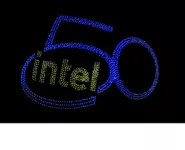50 years is a long time for a company to be in business. I was at IBM’s 100-year anniversary event a few years back and those are far rarer. I recall then IBM CEO Sam Palmisano talking about the fact that at IBM’s 50th there were only a handful of companies that were around as long as IBM was and, at 100, that dropped to an even smaller number. I doubt Intel will make it to 100 years because the firm just doesn’t seem to have the rigor that IBM had to encompass both learning from the past and always positioning for the future. I’m pretty struck by the difference between IBM which treated ex-employees as alumni at the 100-year event and Intel who seems to treat ex-Intel employees like garbage that someone took out long ago.
Unlike IBM that celebrated their event with both current and past employees, Intel’s event was for current employees only. This tends to upset both the official and unofficial Intel Alumni associations and one email I got from one of the members said it best: With regard to ex-employees Intel only wants to make sure the door didn’t hit their butts when they left. Once gone they might as well be dead. So, the vast majority of folks that assured Intel got to 50 years aren’t even invited to the anniversary event which really is like leaving your spouse off the list for your Anniversary party.
Let’s contrast IBM and Intel a bit with regard to how both firms treat history and ex-employees.
IBM: Learning From The Past To Ensure The Future
I think there is a lot of irony in the fact that AMD’s current CEO is IBM trained and certainly did a far better job than Intel’s last 3 CEOs who didn’t make it to full term. But there is a substantial amount of rigor in IBM to both identify candidates for executive positions early and to make sure they are mentored through their career to assure they are around when IBM needs them.
Of the IBM CEOs Thomas Watson Jr., the son of the founder, was likely the most focused on assuring the firm’s long-term survival. He would regularly drop in on employees unannounced and ask them who they fit into IBM’s strategies and initiatives. If they didn’t have an answer Watson Jr. liked he’d hold their management accountable. This assured that every employee was deeply connected to IBM’s core initiatives and long-term strategy helping assure IBM’s success and survival.
IBM did almost go under because of a series of critical errors, however the biggest was in isolating the then IBM CEO so he couldn’t apply his skills to running the company. Sadly, that IBM CEO, John Akers, got fired and was replaced by the only outsider to run IBM Louis Gerstner.
This doesn’t mean that IBM doesn’t have to go through a purge and replace from time to time. IBM’s storage business, for instance, replaced their executive leadership and around 30% of the rank and file employees to break that division from its downward spiral and now they are kicking butt). But the key to this was IBM’s CEO, Ginni Rometty assuring the effort was well supported.
Intel: An Anniversary Without Foundation
Up through the time Andy Grove ran the company it was largely an example of excellence. Strong marketing rapid product advancement, and a brand that was connected to productivity and performance. What was fascinating that once Grove left the company seemed to lose its way, exploring foolish businesses like children’s toys and even web hosting, it seemed to float from failed expansion initiative to failed expansion initiative with Makers and Wearables being just a few of the more recent failures.
With a board largely made up of people so far removed from Intel’s business to largely be ineffective it is no wonder the firm has execution problems. But the big issue during an anniversary is the firm, rather than being a collection of successes used to found future success, seems to largely be focused on trivial current events rather than their iconic history of co-creating the PC and x86 server markets. Their big announcement today? They put up more drones than anyone else. Be still my beating heart…
Granted they don’t really have a CEO now which likely is problematic but there is no sense of the past with the company even at their own 50-year anniversary. They don’t support their Alumni association, they don’t seem to want to learn from their own past, and they certainly aren’t the company that they once were nor, do they seem to even care about that. I mean why look back 50 years if you aren’t going to honor the employees that served during that time?
Contrasting IBM’s 100-year event with Intel’s 50-year event you get a strong sense that Intel missed a meeting. IBM honored the people that made the 50 years possible including IBM customers and leaders that made the company what it became. Even John Akers, the IBM CEO that was fired and replaced by Louis Gerstner was honored. In contrast Intel set a drone record and spoke to what they were doing today almost as if the last 50 years didn’t matter.
Wrapping Up:
A couple doesn’t make it to a 50-year anniversary without family support and certainly not without both spouses. IBM’s 100-year event honored the people that made the 100-year anniversary possible including leaders that perhaps were on the wrong side of history. Intel’s event just seemed to try to honor current accomplishment as if the people that had built the company didn’t matter. That’s a shame because there were some great people over the last 50 years without which Intel wouldn’t exist. I believe that if you forget the past, you likely won’t have much of a future, and Intel’s lack of support and recognition for their alumni, on top of their sequential inability to have successful CEOs, doesn’t bode well for their future at all.
For those of you that built Intel that Intel didn’t recognize or honor during the Anniversary, I remember you and I know the firm wouldn’t exist without your heroic efforts. The fact Intel chose not to remember reflects on current poor Intel executive leadership and not on your efforts. Happy Anniversary Intel Alumni!








